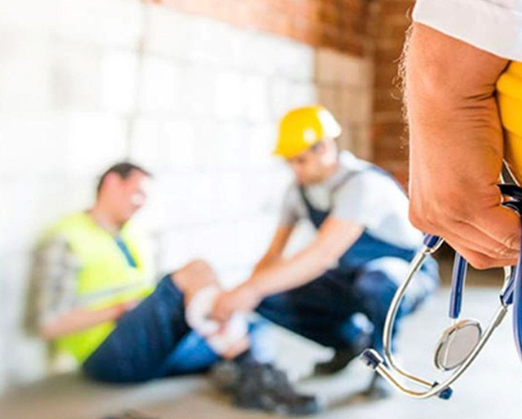Injury at Work FAQ
- What is a Work-Related Accident?
- What are the Most Common Work-Related Injuries?
- What Causes Pain in Knees without Injury?
- How Do You Know if a Back Injury is Serious?
- Is a Bulging Disc the Same as a Herniated Disc?
- What are the Signs of a Herniated Disc?
- How to Heal a Herniated Disc
- What is a Whiplash Neck?
- What are Some Signs and Symptoms of Whiplash?
- What Can Cause Ergonomic Hand Injuries?
- Does Medicare Pay for Work-Related Injuries?
- How Does Workers’ Compensation Work in Florida?
- Where can I get chiropractic treatment for work injuries in Miami, FL?
What is a Work-Related Accident?
Work-related accidents are injuries that occur while you are performing your job duties. These injuries can include anything from sprains to broken bones, burns to lacerations, and even psychological conditions like PTSD or depression. Workplace accidents can happen anywhere and at any time — not just on the job site, but also in the office or even during transit between sites.
What are the Most Common Work-Related Injuries?
The most common type of injury that occurs at work is a strain or sprain. These injuries can be caused by lifting, pushing, pulling and twisting motions. This type of injury generally affects the muscles and tendons in your arms, legs and back.
What Causes Pain in Knees without Injury?
Pain in the knees can be caused by overuse or repetitive motions that put stress on the knee joint. This can lead to inflammation of the bursa (fluid-filled sacs that cushion between bones) and soft tissues surrounding the knee joint. Pain is also felt in some cases due to osteoarthritis caused by the aging of joints and wear-and-tear on cartilage surfaces over time due to aging process too.
How Do You Know if a Back Injury is Serious?
Back injuries range from mild irritation to severe damage requiring surgery. The best way to tell whether or not an injury is serious is by consulting with a medical professional such as a physician or chiropractor who will assess your condition and determine what treatment options are best suited for you.
Is a Bulging Disc the Same as a Herniated Disc?
No. A bulging disc is when there’s extra pressure on the outer layer of your spine, causing it to push outwards. A herniated disc is when one of these discs has ruptured and shifted from its normal position. This can cause nerve irritation and inflammation in your spinal cord and surrounding tissues.
What are the Signs of a Herniated Disc?
You may experience numbness or weakness in one or both arms or legs, depending on where the herniation occurs. You may also experience shooting pain down into your legs or feet and tightness in muscles around your spine.
How to Heal a Herniated Disc
A herniated disc is usually treatable with physical therapy and/or medication, like ibuprofen or acetaminophen. Your doctor will also want you to avoid things that make your symptoms worse (for example, don’t lift heavy weights).y also experience shooting pain down into your legs or feet and tightness in muscles around your spine.
What is a Whiplash Neck?
A whiplash neck is an injury that results from a sudden movement of the head and neck. Whiplash injuries are very common in car accidents, but it’s not limited to just car accidents. Any time you experience a sudden jolt to your body, you can experience whiplash.
What are Some Signs and Symptoms of Whiplash?
Whiplash can cause pain in your neck and shoulders as well as headaches and dizziness. Whiplash may also cause muscle spasms or tightness in your muscles which could lead to more pain than just from whiplash itself.
What Can Cause Ergonomic Hand Injuries?
Ergonomic injuries (i.e. Carpal Tunnel Syndrome) can be caused by repetitive motions, which can occur when you use the same movements over and over. This can happen in a variety of ways:
- Pushing down on the computer mouse repeatedly
- Holding the phone up to your ear for long periods
- Sitting at a desk all day, with your arms resting on the desk and your wrists bent upwards toward your body (as opposed to having them straight out in front of you).
Does Medicare Pay for Work-Related Injuries?
Yes. Medicare pays for the treatment of injuries that occur on the job if you meet certain requirements. To be eligible for reimbursement, you must have been injured while working for your employer on the premises of your employment and the injury must be related to your work activities.
How Does Workers’ Compensation Work in Florida?
Refer to the Workers’ Compensation System Guide provided by the state of Florida.
Where can I get chiropractic treatment for work injuries in Miami, FL?
You can get chiropractic treatment for work injuries in Miami, FL at Silverman Chiropractic™.
We are a team of chiropractors who specialize in helping people who have been injured on the job or while performing their daily tasks. We offer a variety of different treatments, including spinal manipulation, massage therapy, and exercise. We also offer ergonomic assessments and recommendations if you find yourself experiencing chronic pain from repetitive movements. We have multiple accident clinics in Miami. Call us today at 305-680-3069 to schedule a consultation. You may also contact us online.


